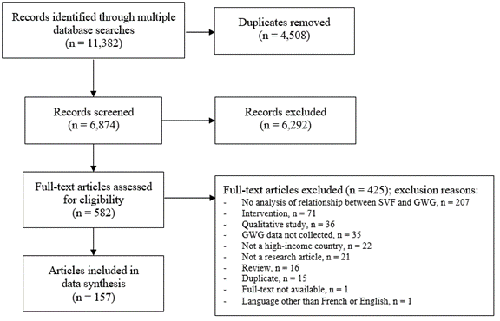
SAINT-ONGE Kadia
- Kinésiologie, Université Laval, Québec, Canada
- Exercise & Sports Psychology, Health & Disease, Physical Activity
Recommendations: 0
Review: 1
Review: 1

Structural vulnerability factors and gestational weight gain: A scoping review on the extent, range, and nature of the literature
Structural vulnerability factors and gestational weight gain in high-income countries
Recommended by Paquito Bernard based on reviews by Kelsey Dancause, Kadia Saint-Onge and 1 anonymous reviewerThis manuscript presents a compelling scoping review examining the structural vulnerability factors associated with gestational weight gain. The topic is highly relevant because excessive gestational weight gain is prospectively associated with an increased risk of gestational diabetes and perinatal mortality.
The authors employed excellent search strategies to address an area that is often overlooked, as structural vulnerability factors are generally understudied or not the primary focus in many existing studies.
A total of 157 academic articles were included in the scoping review. The authors identified eight frequently studied structural vulnerability factors: race/ethnicity (58% of articles), age (55%), parity (31%), education (28%), income (25%), marital status (18%), immigration (12%), and experiences of abuse (physical, psychological, or sexual) (8%). Most studies were conducted in the United States of America, employed retrospective designs, and examined diverse populations in which a subgroup or the entire sample experienced one or more structural vulnerability factors.
This work makes a significant contribution to understanding the role of structural vulnerability factors in gestational weight gain. It highlights the critical impact of systemic inequalities on the health of pregnant women and underscores the importance of addressing these disparities. Furthermore, the manuscript thoughtfully discusses the methodological challenges and limitations in the current literature, particularly in considering interacting structural vulnerability factors and social identities.
From my perspective, this work provides a more detailed and nuanced analysis of structural vulnerability factors in the context of gestational weight gain than previous reviews. This review will undoubtedly serve as a valuable resource for clinicians and researchers, inspiring them to adopt an ‘intersectional lens’ in their future practices and research projects.